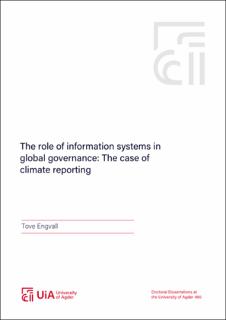| dc.contributor.author | Engvall, Tove Sofia | |
| dc.date.accessioned | 2024-03-21T14:11:38Z | |
| dc.date.available | 2024-03-21T14:11:38Z | |
| dc.date.created | 2024-02-28T10:49:02Z | |
| dc.date.issued | 2024 | |
| dc.identifier.citation | Engvall, T. S. (2024). The role of information systems in global governance: The case of climate reporting [Doctoral dissertation]. University of Agder. | en_US |
| dc.identifier.isbn | 978-82-8427-177-4 | |
| dc.identifier.issn | 1504-9272 | |
| dc.identifier.uri | https://hdl.handle.net/11250/3123663 | |
| dc.description.abstract | We live in a globally interconnected and interdependent world, where societal challenges are increasingly global in character. States and local communities cannot effectively address such challenges by themselves, which is why there is a need for global coordination and collaboration. However, global governance has challenges in responding effectively to the problems. In that context, I explore what role information systems have in supporting global governance to steer towards a sustainable future, bringing us to the domain of digital governance. Digital governance includes the use of digital technologies in governance structures and processes. Extant literature shows that digital governance, if adequately applied, may improve structures, processes, and qualities of governance, such as transparency, accountability, efficiency, effectiveness, and ways to interact with stakeholders. Furthermore, scholars argue that digital technologies can improve the implementation capability for the sustainable Development Goals, through for instance strengthening institutional capacities and governance innovation, but there is a need for further conceptualization and directions on how to utilize digital technologies. Unfortunately, the research on the application of digital governance in global governance structures and processes is very scarce, leaving us unknowing of how information systems could support global governance. As global governance has conditions that are different from national and local governance, it requires both theoretical and empirical foundations that consider its characteristics, to address its challenges appropriately. To understand digital global governance, we must both understand global governance and its challenges, as well as the use of digital technologies in such settings. This thesis identified climate change as the focal area of global governance to study. The Paris Agreement, the current international climate agreement, was adopted in 2015, with the goal to limit global warming to well below 2°C, preferably 1,5°C, compared to pre-industrial levels. Under the Paris Agreement, countries make voluntary commitments, and every fifth year, progress is evaluated in a Global Stocktake. Countries report regularly on their commitments, emissions, measures, and projections, which are used to inform decision-making, assess implementation, and evaluate progress. The reporting relies on an extensive use of digital technologies and is regarded as an example of digital global governance. It has been selected as the case for in-depth investigation of this thesis… | en_US |
| dc.language.iso | eng | en_US |
| dc.publisher | Universitetet i Agder | en_US |
| dc.relation.ispartof | Doctoral dissertations at University of Agder | |
| dc.relation.ispartofseries | Doctoral dissertations at University of Agder; 460 | |
| dc.relation.haspart | Paper I: Engvall, T. & Flak, L.S. (2022). Digital governance as a scientific concept. In Y. Charalabidis, L. S. Flak & G. Viale Pereira (Eds.), Scientific Foundations of Digital Governance and Transformation. Concepts, Approaches and Challenges, 38, (pp. 25-50). Springer Cham. https://doi.org/10.1007/978-3-030-92945-9_2. Accepted manuscript. Full-text is available in AURA as a separate file: https://hdl.handle.net/11250/3124434 | en_US |
| dc.relation.haspart | Paper II: Engvall, T.S. & Flak, L.S. (2022). The state of information infrastructure for global climate governance. Transforming Government. People, Process and Policy, 16(4), 436-448. https://doi.org/10.1108/TG-05-2022-0064. Accepted manuscript. Full-text is available in AURA as a separate file: https://hdl.handle.net/11250/3124431. | en_US |
| dc.relation.haspart | Paper III: Engvall, T. (2021). Exploring the Impact of Digital Global Governance through Affordance Theory: the Case of Climate Reporting. EGOVCeDEM- ePart 2021, September 7-9, Granada, Spain, 3049, 219-230. https://ceur-ws.org/Vol-3049/. Published version. Full-text is available in AURA as a separate file: https://hdl.handle.net/11250/3124442 | en_US |
| dc.relation.haspart | Paper IV: Engvall, T. & Flak, L.S. (2022). Affordances of e-reporting on a supranational level: the case of Reportnet. EGOV-CeDEM-ePart 2022, September 6-8, Linköping, Sweden, 3399, 1-15. https://ceur-ws.org/Vol-3399/. Published version. Full-text is available in AURA as a separate file: https://hdl.handle.net/11250/3124449. | en_US |
| dc.relation.haspart | Paper V: Engvall, T., Flak, L.S., Sæbø, Ø. (2023). Sharing, Cooperation or Collective Action? A Research Agenda for Online Interaction in Digital Global Governance. In: Krimmer, R., et al. Electronic Participation. ePart 2022. Lecture Notes in Computer Science, 13392 (pp. 91-106). Springer, Cham. https://doi.org/10.1007/978-3-031-23213-8_6 Accepted manuscript. Full-text is available in AURA as a separate file: https://hdl.handle.net/11250/3124461 | en_US |
| dc.rights | Attribution-NonCommercial-NoDerivatives 4.0 Internasjonal | * |
| dc.rights.uri | http://creativecommons.org/licenses/by-nc-nd/4.0/deed.no | * |
| dc.title | The role of information systems in global governance: The case of climate reporting | en_US |
| dc.type | Doctoral thesis | en_US |
| dc.description.version | publishedVersion | en_US |
| dc.rights.holder | © 2024 Tove Engvall | en_US |
| dc.subject.nsi | VDP::Samfunnsvitenskap: 200 | en_US |
| dc.source.pagenumber | 306 | en_US |
| dc.source.issue | 460 | en_US |
| dc.identifier.cristin | 2250533 | |






